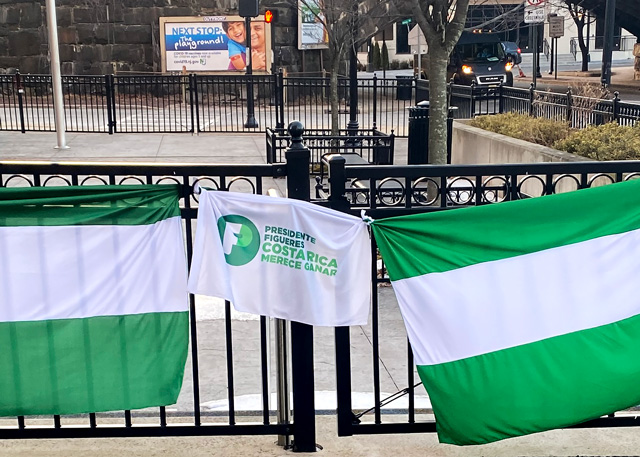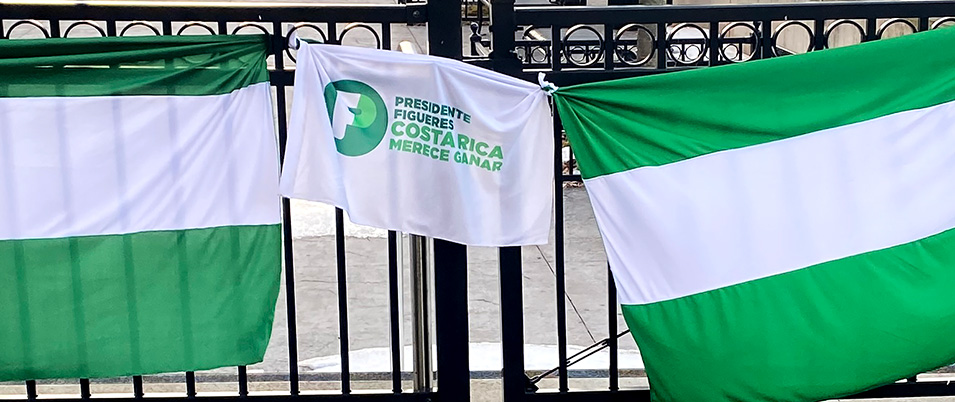By Elias Dominguez
Costa Ricans throughout the North American Northeast cast their votes for president on February 6th in Elizabeth, NJ. Voter turnout for these elections were down across the board since the last election in 2018, but you would not guess it from the dutiful crowd that turned out on the first Sunday of February. Booths were set in Union County College on West Jersey Street by Grand Street where thousands of lawful permanent residents from Costa Rica, some from as far as Philadelphia, made the trek to fulfill their civic duties.

“[Voting] is an opportunity that we have abroad, and it’s one to value because in many countries this is not the case,” David Hernández said. “We have to jump at the opportunity, and come and exercise our right.”
Another voter, who declined to provide his name, found the effort of going out of his way to travel to Elizabeth worthwhile to uphold his county’s culture of civic responsibility. This was the prevailing sentiment among the voters as Rafael Durán demonstrated while speaking on the subject. “It’s a blessing,” he said. “Although we are not in Costa Rica, we are abreast to what is happening; and so, yes, it makes us feel good to be able to vote.”

The long-standing democracy, among the most stable in Latin America, faces one of its darkest times. The coronavirus pandemic that has ravaged the labor market and a stifling bureaucracy is impeding economic growth, capital investments and financial confidence internationally. Particularly hard hit was the middle class, sole proprietors and entrepreneurs of small and mid-sized businesses, which compounded the financial woes of the country and led to a skyrocketing of the national debt.
In the eyes of many Costa Ricans, the botched handling of the pandemic by President Carlos Alvarado Quesada’s government is to blame for the crisis. Many of the candidates ran their campaigns by contrasting themselves with the unpopular president.
 Rogelio Martinez spoke of his decision to vote for former President José María Figueres, reiterating the nation’s calls for competent governance. “[I voted] because he’s experienced, in addition to his know-how and many years in office and the great staff who accompany him,” said Martinez.
Rogelio Martinez spoke of his decision to vote for former President José María Figueres, reiterating the nation’s calls for competent governance. “[I voted] because he’s experienced, in addition to his know-how and many years in office and the great staff who accompany him,” said Martinez.
Costa Rica elects its presidents through a two-round system that calls for a runoff election between the two candidates most voted for—should any fail to receive 40% of the vote. Figueres had been polling well in the lead up to the election and was positioned as the favorite, however, he failed to cross this threshold.
Enthusiasm for Figueres was palpable in Elizabeth, NJ. The former president was certainly aware of this and his party—Partido Liberación Nacional (PLN)—had set up camp at the college’s campus. Members of the party had been shepherding their own to the polls and providing assistance to further streamline the process.
“He already was president during 94-98 and, in the last 20 years, has acquired valuable experience working with international organizations,” said Hernán Marín, attorney general of PLN. “He is what Costa Rica needs.” Marín, who had assumed the role of chauffeur for Figueres’ voters on this day, spoke of his candidate’s involvement in efforts to combat climate change and said, confidently, “With José María much will improve.”
Figueres will run against Rodrigo Chaves, a former minister turned critic of Alvarado Quesada’s government with a background as an accomplished economist. Chaves managed to narrowly overtake well-known politician Fabricio Alvarado Muñoz and former Vice-President Lineth Saborio, with 16.78% of the vote to their 14.88% and 12.40%, respectively (both of whom had polled above Chaves prior to the election). However, he remained noticeably behind Figueres’ 27.28%.
The runoff election is set for the 3rd of April at a location yet to be announced.



